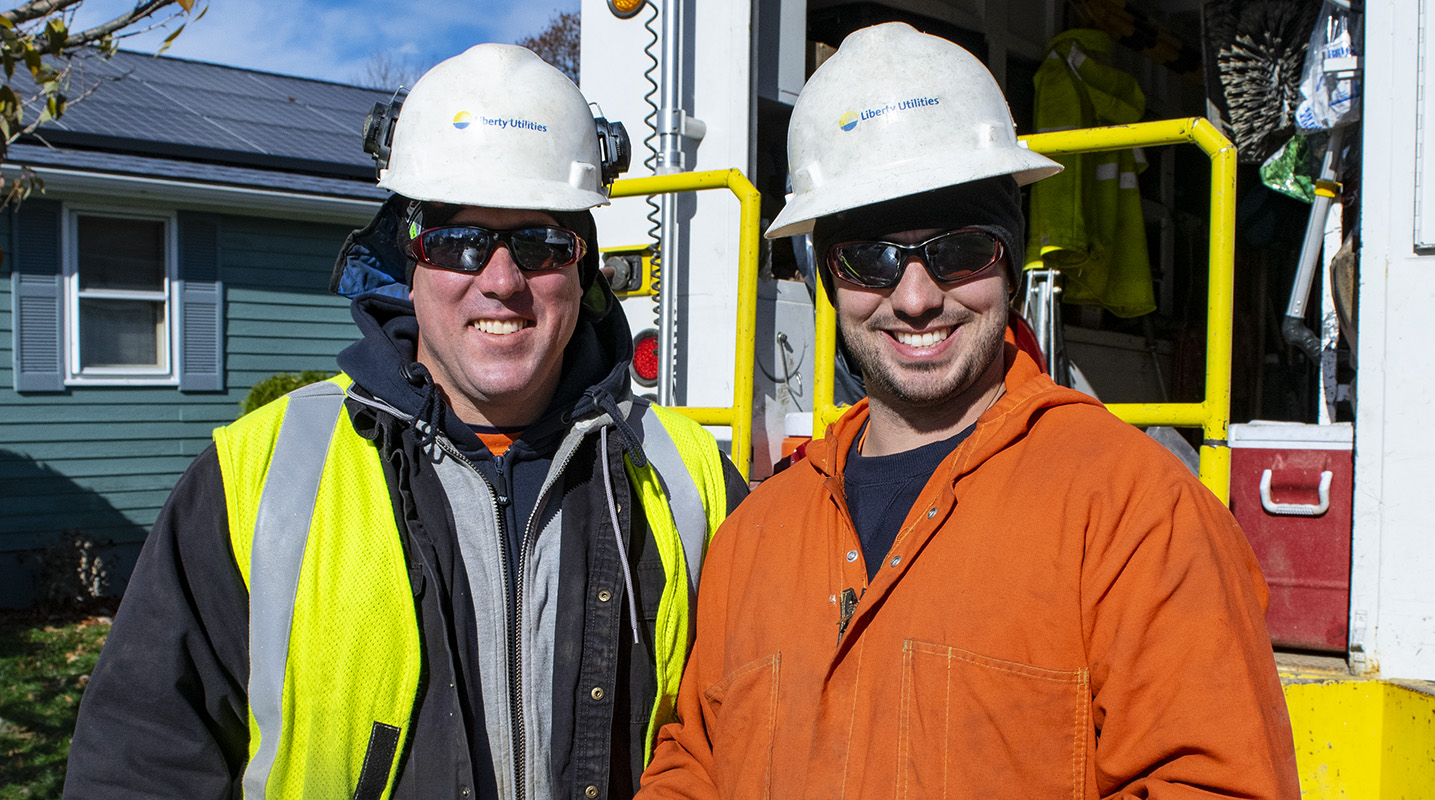Natural Gas Safety - Residential - Massachusetts Gas - Liberty
For Emergency Responders
Click the link below to learn valuable information on responding to emergencies that may involve natural gas facilities.

What We Do
Damaging an underground facility is not only dangerous, but it can cause outages, expensive repairs and legal action. To help minimize the amount of damage that may occur to our natural gas distribution system, we have highly trained personnel who help protect our system from damage. These employees participate in the federally mandated Operator Qualification Certification Program at our state-of-the-art training center in Fall River, MA.
Liberty is also a member of DigSafe®, a not-for-profit clearinghouse that notifies participating utility companies of residential or business’ plans to dig. In turn, these utilities (or their contract locating companies) respond to mark out the location of their underground facilities. This helps others know which areas to avoid when digging therefore helping to keep our underground infrastructure safe.
It’s easy to contact DigSafe by calling 811 or visiting www.digsafe.com. Remember to call DigSafe before you dig. It’s free. It’s easy. It’s the law!
The natural gas pipeline infrastructure is the nation's safest energy delivery system. Liberty has experienced personnel who routinely inspect and maintain our distribution system. Company personnel are available to respond to emergencies 24 hours a day, 7 days a week.
Excess Flow Valves are safety devices installed on some service lines to minimize the flow of gas in the event a service line was damaged. Click below for additional information on Excess Flow Valves.
We are in the process of replacing all aging and leak prone pipe comprised primarily of cast iron and bare steel gas mains and bare steel service lines on our distribution system. This program will make the distribution system more reliable and safer and will decrease the amount of leaks that could occur on our system for many years to come.
Although we replace cast iron and bare steel main with plastic main every year, a large portion of pipe in our service territory is coated steel. In order to increase the lifetime and maintain the safety of coated steel piping, our Corrosion Department is dedicated to protecting steel pipes through periodic corrosion testing and by installing and maintaining cathodic protection equipment.
“Cathodic protection (CP) is a technique used to control the corrosion of a metal surface by making it the cathode of an electrocchemical cell. A simple method of protection connects the metal to be protected to a more easily corroded "sacrificial metal" to act as the anode. The sacrificial metal then corrodes instead of the protected metal. For structures such as long pipelines, where passive galvanic cathodic protection is not adequate, an external DC electrical power source is used to provide sufficient current.” As defined in Wikipedia.
To keep our natural gas distribution system both safe and reliable, we conduct multiple inspections and surveys every year.
For every job we do, Supervisors adhere to Standard Operating Procedure (SOP) for the crews that will be completing the job. The SOP contains detailed, step by step instructions and includes everything from cutting a piece of pipe to completing “critical steps.” Critical steps are larger tasks that, once completed, could affect the operation of our distribution system.
Before any critical step is started, our employees and contractors are required to call our Gas Control Center before starting the work.
Our crews, Gas Control Center, and Operations Supervisors are in constant communication with each other to ensure that everyone is aware of the status of our system and can respond to any given situation quickly, safely and effectively.
The Company monitors our distribution system through a System Control and Data Acquisition System (SCADA) at our Gas Control Center in Fall River, MA. SCADA monitors the temperature, pressure and flow of the gas throughout our distribution system. This information is monitored by our Gas Control Department. As conditions change in the distribution system, Gas Control personnel will respond to normal and abnormal operating conditions to ensure the safe operation of the system.

What You Can Do
Carbon monoxide, or CO, is a normal by-product of fuel combustion, but high levels of it indoors can be dangerous to your health. Typical heating fuels (oil, coal, wood, gasoline, kerosene, diesel fuel, or natural gas) can create carbon monoxide. Carbon monoxide has no odor, color or taste, but can cause serious health issues. Take steps to make sure your home is protected.
As the customer of record, you or the property owner are responsible for customer-owned gas lines that begin at the outlet of the gas meter and extend — either above or below ground — to natural gas-burning appliances. Make sure your pipes are getting the attention they need.
Planting a tree? Installing a fence? Planning a home improvement? Call 811.
Did you know it’s the law to make this call? Electric power lines, natural gas pipelines, water pipes, communications lines and other utility services can be within a few feet of the ground’s surface. Not knowing where these lines are can result in personal injury, property damage and neighborhood service interruptions. Even a small dent or a scrape can cause damage, resulting in a leak or service-wide disruptions.
Gas appliances are safe and efficient. Like all appliances, certain safety precautions should be followed. Make sure your family is safe by following these guidelines.
Please contact Liberty Utilities at 1-800-544-4944 before adding natural gas appliances to ensure that the service line and meter are sufficient for the additional gas load.
Maintaining chimneys and flue pipes is an important safety requirement. Liberty Utilities urges you to have a licensed heating contractor periodically inspect your chimneys and flue pipes for safe operation.
CCST is a flexible, stainless steel pipe used to supply natural gas and propane in residential, commercial and industrial structures. Coated with a yellow, or in some cases, a black exterior plastic coating, CSST is usually routed beneath, through, and alongside floor joists in your basement, inside interior wall cavities, and on top of ceiling joists in attic spaces.
While this type of pipe is safe, it is strongly recommended that you determine if the CSST system is properly bonded and grounded. A bonding device should be installed on your natural gas system in order to reduce the chances of a natural gas leak or fire. Bonding is provided primarily to prevent a possible electric shock to people who come in contact with the gas piping and other metal objects connected to the grounding system. Nearby lightning strikes can also result in an electrical surge and can potentially puncture a hole in the CSST. Proper bonding and grounding will reduce the risk of damage and fire from a lightning strike.
If you are unsure as to whether your business has CSST or whether it has been properly bonded and grounded, contact a licensed electrician to arrange for a professional inspection.
Keep Your Meter Accessible Year-Round
Liberty needs safe, unobstructed access to your natural gas meter at all times. Please keep walkways, driveways, and the area around your meter clear throughout the year, especially during winter months when snow and ice can create hazards.
Winter Snow and Ice Safety Tips
When clearing snow and ice near your natural gas meter, please follow these safety guidelines:
Use caution when shoveling or operating snow blowers and snowplows near your meter.
Gently remove snow and ice buildup by hand using a brush or broom.
Do not use sharp tools, salt, ice-melting chemicals, or hot water, as these can damage the meter or piping.
Carefully remove any ice or snow hanging from roof edges above the meter to prevent falling hazards.
Keep natural gas appliance vents and air intakes clear to ensure proper operation and ventilation.
Year-Round Maintenance
To help ensure safe access, please keep shrubs and vegetation around your meter neatly trimmed during warmer months as well.
Keeping your meter area clear helps protect your safety, ensures reliable service, and allows Liberty to respond quickly when access is needed.
